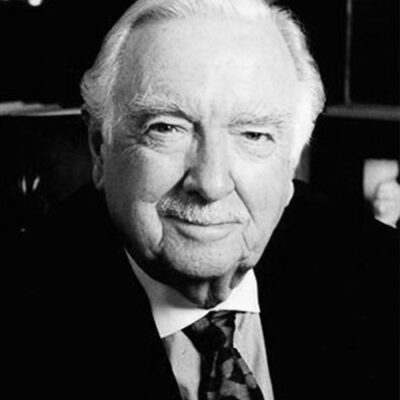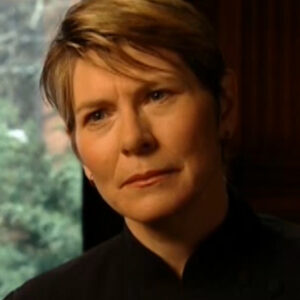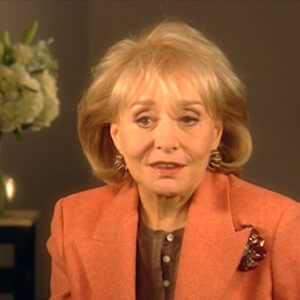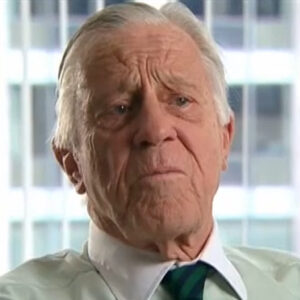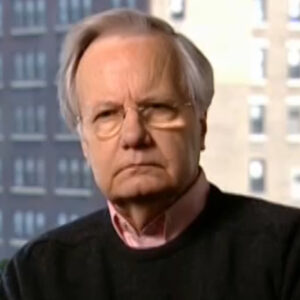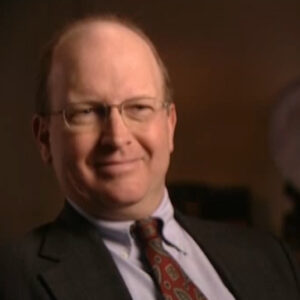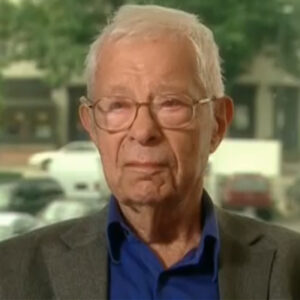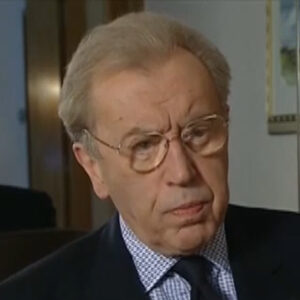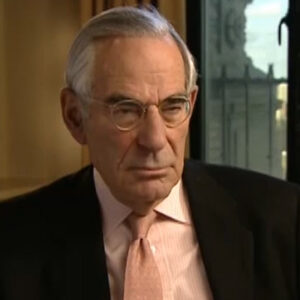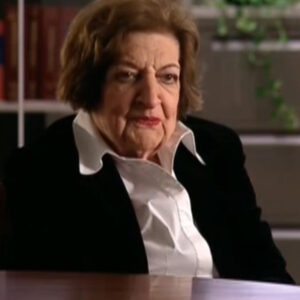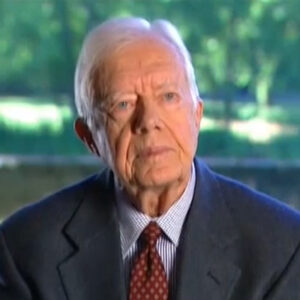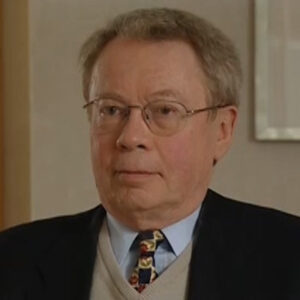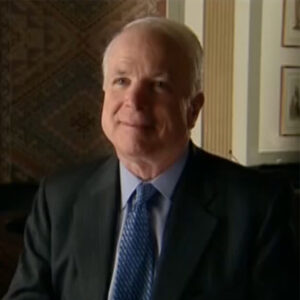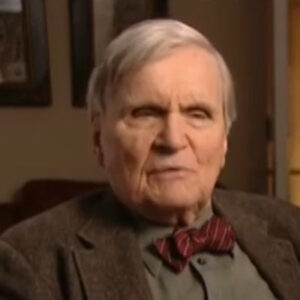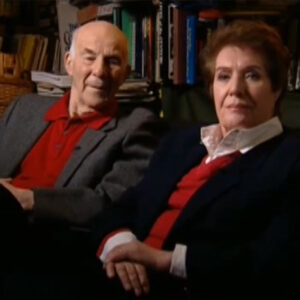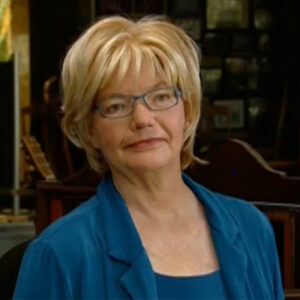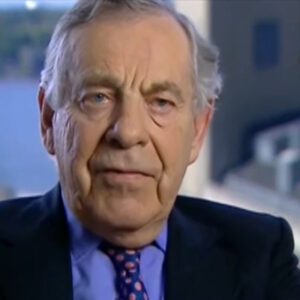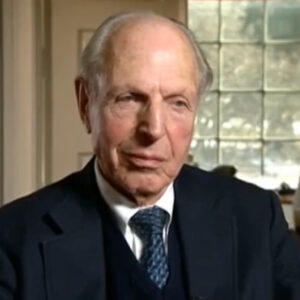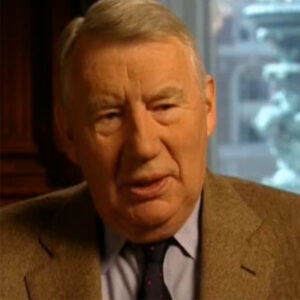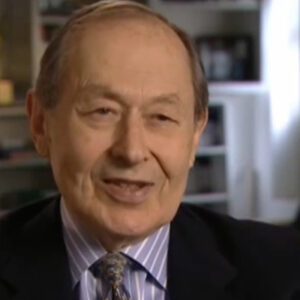Speaker It was you were there. It was the series. And tell me a little bit about it, because a lot of people don’t.
Speaker It’s going to sound rather shocking, but this is a program that would begin with an announcer and voice, very stentorian, saying March 15th, 34 B.C., the assassination of Julius Caesar. And you are there. And what it would be would be a historical recreation of a recreation of a historical event. Covered with modern news techniques so that our anchor man would be the first thing you’d seen behind a desk. Martin. Not in the toga.
Speaker And he would give us a little background to what had been happening. Tension has been very high up at the forum all day. And we switch you now to Harry Reasoner at the forum and there would be people passing by.
Speaker And Harry Reasoners voice. And at some point he would say, Brutus, Brutus, could you just give us a few words? And an actor playing for his return to be interviewed. Now, I know it sounds ridiculous, but it was a wonderful show and worked very successful and really very powerful. Somehow or other, through a combination of techniques, we got past the hurdle. Brutus, would you mind saying a few words got past that hurdle and and people just accepted the reality of it?
Speaker Now, you just mentioned you said Harry Reasoner says this is about Walter Cronkite. You can is there. I thought Walter Julius Caesar. Was it Harry?
Speaker Walter did. Walter Cronkite did all of Walter was the anchor man. And so Walter was the one at the desk and Walter was on every single show. Whereas individual news people from the CBS News Department would come and go in the other roles. But Walter was in every show.
Speaker Now, did you.
Speaker Did he collaborate with you on these programs or did you give him this Walter?
Speaker Walter? Walter got a completed script because it was so, you know, a half hour show, which is heavy. And also, he was doing his other work at the time. He was doing his news shows. And I don’t think he was the CBS anchor at that time. I think that happened after you are there. But he had plenty of other work to do. So it worked out well for both of us.
Speaker I wonder if you could, in a sense, tell that story of Julius Caesar or Socrates or one of the stories, again, featuring Walter Cronkite. I mean, you mentioned Harry Reasoner, if you could. You said the anchor person, even Walter Cronkite just said, oh, sure.
Speaker No, I thought you wanted to save that, which is why I didn’t want to put it put him into it. What would happen is as soon as this stentorian voice finished and a very simple white on black sign up there with the date of March 15th and we would cut to Walter Cronkite behind the desk and he’d be walking off a teleprompter, but looking directly into the lens. And he would fill in the background to the story. The fights that were going on in the forum and the belief that Caesar wanted to be a dictator and so on and so forth. So he was on every week. And he also at the end of the program, he summed it up and gave you an indication of what happened afterwards, ending up with what became then the famous line all over. Well, at the beginning. All things as they are as they were then, except you are there. And then at the end of the program, that’s the way it was on March 15th. That allowed the.
Speaker I forgot what the tag line was. But it became it became quite famous. How did you pick your stories?
Speaker I have no idea. I was directing every show, so I was just working my tail off. And Charlie Russell, a wonderful producer, Charlie. And I don’t know how involved CBS was. And and the writers would pretty well pick the incidents. But what was fascinating, too, was the research department and CBS, which was sensational.
Speaker Now, I wonder if you could tell me maybe in a couple of your favorites. Do you remember? We have a couple of shows that were really your favorite shows.
Speaker There were and there were a number of shows that really were dramatically very impressive. The death of Socrates was.
Speaker With Barry Jones playing Socrates and Richard Kiley and John Barry Gray and Paul Newman in the cast, Robert Culp was in the cast. Marvelous actors and.
Speaker There were many, many good shows. Assassination of Julius Caesar was one, the burning of Joan of Arc was Kim Stanley was a marvelous show. I remember with great affection Salem Witch Trials, which we coordinated with Ed Murrow’s show on McCarthy. We did ours. Two weeks later and we were both on Sunday. So it’s sort of a nice one two punch. But. It was really from a dramatic point of view of a. A powerful piece of work, despite it, how ridiculous it sounds.
Speaker What was the reaction of the audience to the series? Well.
Speaker I only know that the show is enormously popular and successful, so successful that CBS ruined it because after two years, after two seasons, because they felt the monetary gains would be so enormous, they put it on to film. Well, clearly, you cannot cover a modern new show with modern use technique on film and has to be live TV. That’s the essence. And I think it only lasted one season on film. Was it undermined the fundamental principle of the show?
Speaker And the principle was that life feel like death was totally.
Speaker The whole field of the show was it was a live news show emanating from CBS where Walter as the anchor man and we used all of the CBS News Department to use Harry Reasoner and Don Hollenbeck and Mike Wallace and just, you know, the whole slew of great correspondents.
Speaker And, boy, they happened then.
Speaker Did you. Were there any situations that because it was alive? Were there situations where the anchor person had to sort of, you know, deal with the unexpected?
Speaker Walter? We worked in the studio. I guess maybe, oh, four times the size in this room was a tiny room and we’d have sex there and 20 and 30 extras and things all going, hooray, array, array. And Walter’s desk was just the tiniest corner of the studio. And on two occasions, one of the very first show. The Hindenburg disaster, when the Zeppelin came over from Germany and blew up in Lakewood and Pompton Lakes, I believe it was in New Jersey and on the burning of Joan Waak, because the studio is so tiny and the air conditioning is so weak. And we would come to Walter in at the end of the show for a summing up and there would be smoke drifting slowly, Krutz with the burning of Joan of Arc. He was live during his final migration like that. So, yeah, that happened.
Speaker We we have some clubs for the conquest of Mexico and the Louisiana Purchase.
Speaker Aha. Colquitt Conquest of Mexico. That was Eartha KITT, I believe, played in that.
Speaker I don’t remember who played Montezuma. Eartha KITT played the woman who betrayed him and teamed with the Spanish show the way into the Spanish forces.
Speaker I really don’t remember much else about the show, except that we, of course, could not do the main thing, which was that the militarily it was one, as you may or may not know it.
Speaker I think a hundred and twenty Spaniards and thousands and thousands of.
Speaker And in the native population, ready to oppose them, except that the horses, they have never seen horses before and the horses became terrifying and they had I had a prediction of gods coming, half man, half horse. And there it was. And they just fled in terror at the sight of these horses. Needless to say, that being the heart of it, we couldn’t show horses because I don’t think two of them would have fit into the studio.
Speaker What distinguished the program was that they were historic events reported as if in the modern day. Where did these where did these ideas? I know that you didn’t you weren’t well.
Speaker Did they have any implications? I guess because what we’re trying to find out is you you hired writers who were on blacklisted.
Speaker I wonder if you could talk a little bit about that, about.
Speaker Well, there were two Abraham Polonsky right before for. Right. And I think any man off script to.
Speaker What happened was that it needed.
Speaker As you can tell it just and the subject matter styles other than modern American realistic language. Not easy to find because most of the television writers could deal with colloquial speech, but very few could not. Would not sound silly putting words into the mouth of Socrates or Queen Elizabeth.
Speaker That was another lovely show. The first performance of Romeo and Juliet for Queen Elizabeth with Chris welcomes Brother Kenny, who is twelve years old, playing Juliet because in those days, a boy played woman’s parts.
Speaker So the subject matter. Well, we weren’t aiming for relevance any more than history is relevant.
Speaker As simple as that, the only conscious relevance that we ever attempted was, as I said before, the show about the Salem witch trials, which we did right after Murrow had done his initial attack on McCarthy.
Speaker But the three writers, we were not allowed to use their names. I didn’t I didn’t know they were writing it then only only Charlie Russell knew the producer. And someone at CBS must have known the checks were made out to. If my memory serves somebody named Kate Nicholson, who I don’t even think was a writer. And whoever she was, she had the problem of tax and then Social Security deductions. And so I don’t really quite know how they did it other than the fact that it was done. The scripts were brilliant. There’s a volume of Polanski’s scripts that appear on you are there. And it’s very impressive reading.
Speaker Now, if you could just say a bit about that, some of these riders, you found out later some of these riders were riders who were blacklisted. That’s a piece that we don’t know. Our audience won’t know that Mr..
Speaker I think.
Speaker They’re generally in lock in television in those days. Some of the blacklisted writers were used fairly heavily. One of the reasons being that on certain programs they did that because they could get them for less money. The guys were desperate. They were writing under a pseudonym and. And therefore, if they were twice over, scale of scale was five hundred dollars a script and their price, because they were good writers with a thousand scripts, you could get them for union minimum or maybe even less. Or with a kickback that was a normal part of the procedure. Then the writers that we were using had been working for us on another show we were doing at the same time, a melodrama also for CBS called Danger a half hour, a melodrama and all of them. Walter, Abe and Arnie had written script scripts for Danger and that started before blacklisting. And those scripts, they were using their own names. So for Charlie Russell, who was producing, it was an easy transition, especially since we were doing both shows. At the same time, it was important to keep the nucleus together. What was very interesting was that Russell. Was really the most naive kid from Kansas or Iowa. Midwestern. He’d been an actor unsuccessfully under contract to 20th very handsome contract player at 20th. They dropped him. He’d come to New York, tried to act in television, didn’t work, and somehow got involved with producing for CBS. He was the most apolitical person I’ve ever known. He wasn’t interested in politics at all. What did interest him enormously was what he felt was the sheer unfairness of the blacklist. And it became a passionate concern of his so that even if there was the opportunity to use other writers, Charlie preferred to use the blacklisted writers because he felt he was contributing something in that way.
Speaker Now, when you were working at CBS at that time, was Walter already a sort of known personality or at this point he was just one of the guys, Walter, that time was one of the group.
Speaker A little bit better that a little more visibility than the group. But he wasn’t the I as I said before, I don’t think he was anchoring the CBS News, the national news desk. I think it was the six p.m. show that not seven or six, 30, but. It was a very careful process picking him, and we were all involved in that because I remember there were other correspondents who were greater favorites of Moreaux and Murrow was the influence Murrow and Friendly. And I remember Don Hollenbeck particularly was a great, great chum of Murrow’s and and a very impressive news man.
Speaker Hollenbeck had a kind of serious reserve about him. And we felt.
Speaker That because the premise of the show is so silly, it’s so outrageous that we needed somebody with the most. American homespun, warm ease about it. The great thing about Walter that is most moving when he was doing any of the space shuttle launchings or the rocket launchings or God knows that unbelievable day when he was handling the death of Kennedy, that even when he was filled with emotion, they stayed kind of Homesh simplicity about him that was easily identifiable with.
Speaker I mean, many years later, when I ran, President Johnson decided not to run because he said if we’ve lost Cronkite, we’ve lost it all.
Speaker That was very true because he seemed to be the kind of essence of true America. He was not he certainly not eastcoast. Certainly not West Coast. Not Southern. Just somehow American and hurt. So for our show, it was very critical that we had that kind of persona. And the show, as I say, was that popular? I think it had a little bit to do with propelling him into the figure of prominence that he became.
Speaker Did you have a sense that that Murrow, Fred Friendly, you had a sense at all that they sort of they came out of not saying that that Cronkite didn’t come out of print journalism, but did you feel that that truth had a kind of look down a bit on Cronkite?
Speaker I don’t know that they looked down on Cronkite, but I do think that they had a feeling of.
Speaker Newsmen who existed before television.
Speaker I think there was a kind of snobbism involved so that. And it applied with greater and greater bias. The younger the television commentator was I remember Mike Wallace was one of the correspondents and they didn’t take him seriously. First of all, he’d been an actor, which was the worst thing you could be before you were a newsman. His wife was an actress. So it was the double whammy. And there was that feeling that a print journalist was somehow superior to a television journalist.
Speaker Now, can we just quickly.
Speaker Was good technically, and I had an offer to stay with the news department or go with a drama department. I chose the drama department.
Speaker I want to ask you a little bit. I know you directed. You didn’t write network, but you wrote. You directed that.
Speaker Did you use a lot of your experience having worked at CBS? I mean, did that play into you?
Speaker Well, you know, people always used to say what a Britain satire network was. And Paddy Chayefsky, who wrote it and I would say this is not a satire. It’s sheer reportage. Not that it really was reportage, but it was darn close. And so, funnily enough, the CBS time was a wonderful time.
Speaker Because it was.
Speaker It was a really terrific network to work for this man, Charlie Underhill is in charge of the drama department. He had as much freedom as they could give. You wonder that commercial setup, for instance, on the show Danger that I was telling you about.
Speaker We had a sponsor in the Block drug company which made evident toothpaste and Paco paid toothbrushes.
Speaker And the sponsor was a totally civilized man by the name of Mel Brooks. And he. Not that no Brooks, another member, and now said, look, I know you guys want to do more serious stuff, he said.
Speaker I’m selling toothpaste. And so why don’t we come to this arrangement? You do two for me and then one for yourselves. In other words, every third show, I won’t even read the script on you just do it. And that kind of spirit existed and it was wonderful. And the network had some of that, too. It was later on after my CBS contract was over and I began freelancing and doing shows of bigger and bigger budgets on NBC and ABC and CBS, our shows, not even to our shows that that’s when the madness began. And it was madness. It was.
Speaker Silly to do.
Speaker I mean, I remember I did the Philadelphia Story in one hour, which meant actually forty seven minutes. And this. Mr. Barry had wanted a forty seven minute Philadelphia story. He would have written a Philadelphia Story for 40 minutes.
Speaker So we did Don Quixote in a half hour. So that kind of outrageous. You couldn’t hardly experimentation. Just try to be classy, doing classic subject matters and reducing them to these silly time periods with commercial breaks.
Speaker So it did become a little bit.
Speaker One can easily poke fun at someone that would draw a lot from your experience at CBS News, since you did do you did some work at CBS.
Speaker There was nothing of CBS in the network. Patty used to say that he’d gotten a lot of of his information. He was very close friends with John Chancellor, who was Walter’s equivalent at NBC then. And I never I never called Walter to say Walter is accurate. Can you give us some anecdotes or what have you?
Speaker Patty is was one of the great American dramatic writers, and she left that to him.
Speaker No. Did you after you. Left CBS and started your own career. Did you. Did you watch what happens? Were you surprised by what happened to Cronkite with the kind of power that he sort of had as an anchor person? I mean, did you have some sense of that? And. Did you have any any feelings about that watching?
Speaker I did have a sense of the kind of importance that the anchor man was taking on in American life. My basic feeling was, thank God it’s Walter, because I felt he was honorable.
Speaker I felt he was a good reporter. And boy, was that right.
Speaker He was, to me, the personification of a combination of objectivity and yet commitment.
Speaker There was a reason, I think I. Let me start that again. I think that one of the reasons.
Speaker That we were able to stop a war. I’m talking about the Vietnam War. Without a revolution. Totally peacefully. Was when Walter Cronkite showed. Guys with their Zippo lighters lining the roofs of Vietnamese villages and in one instance, cutting off the ears of dead Vietcong. Americans have never thought of their sons doing that kind of thing. We were in those kinds of troops. But when Walter showed it, you believed it. And there was no possibility that you would believe anything else.
Speaker And he showed it would be interesting to see what what he would do today if if Ari Fleischer or George Bush or whoever said, oh, why don’t you show some good news about Iraq, you know, he’d say, what good news? You tell me why, Joe. He was he seemed to me incorruptible in a.
Speaker Profession. That was easily corruptible.
Speaker So you weren’t. Were you surprised when he actually made that statement because he was always someone you really tried to report the facts and not offer his opinion, which they decided to the. When he said when he came back from the Tet Offensive, it said we you know, this is a stalemate we should give out. Did that surprise you?
Speaker I was thrilled when it when he came out with that statement.
Speaker But I was not surprised that he came out with the statement.
Speaker But I was surprised that a news man made that statement that the company didn’t cut it off as he was saying it. It was interesting. Apropos of the blacklist, CBS. Suffered much more stringently under the blacklist than ABC or NBC. The reason was that. The black listers and they were a group they were an organization where specifically after CBS News. And specifically within CBS News, Don Hollenbeck, who they felt was I don’t know whether they thought he was a communist. They felt he was certainly too left. And in one of these glorious times, he would not let that news place be touched, largely because Edward Quick as would friendly of Kuwait. But I don’t know what his own conviction was, but there was no way he was to let that.
Speaker News department be.
Speaker Nailed. And anybody else in charge of it. So he held firm on that. The result was that they blacklisted far more people on every other end, on the dramatic end, on the musical end. So that, for instance, I would not be allowed to use certain actors who were working at NBC or ABC, but that they wouldn’t let them appear on CBS. There was an attempt to punish CBS because Paley held firmly.
Speaker Rigid about the news department not being touched.
Speaker How did you become friends with what you to continue your relationship with Walter over the years?
Speaker I always was working too hard to become really close friends. But we saw each other very, very often, moved in a lot of the same circles. And always I saw him last night. And it’s like we pick up right where we left off.
Speaker And in terms of outside of the professional. View that one has of Walter. What what can you tell us about his more private self?
Speaker He’s a magnificently jolly man. He has a very good time. He’s.

